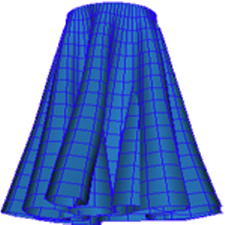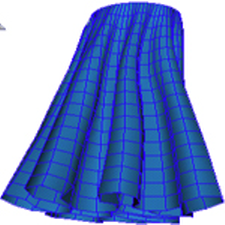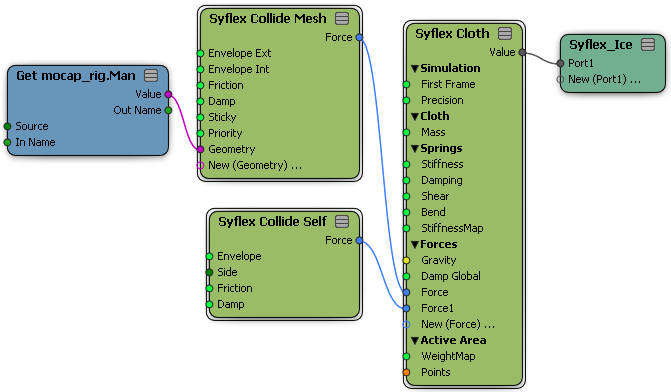In addition to collisions with other objects, you can create self collisions for a cloth, such as preventing a cloth from intersecting itself when it folds up or flaps in the wind.
You can use self collisions in conjunction with other types of collisions. For example, if a cloth is a long, flowing robe on a character, you can use the character's body as a collision object with the Syflex Collide Mesh node, then add the Syflex Collide Self compound so that the robe's surface doesn't interpenetrate itself upon collision.
You can choose which sides of the cloth are computed for self-collisions: both sides (such as for the skirt below), only the outside, or only the inside. The sides are determined by the direction of the cloth object's normals: outside is the side in which the normals are pointing, and inside is the opposite of this.
In the image below on the left, there is no self collision so the skirt's folds intersect each other.
In the image below on the right, self collision is used so that the folds don't intersect.


To create self collisions for cloth, follow these steps:
Create a Syflex ICE cloth simulation - see Creating Syflex ICE Simulations.
Choose the Particles  Collision
Collision  Syflex
Syflex  Add Collide Self command from the ICE Tree toolbar.
Add Collide Self command from the ICE Tree toolbar.
This updates the Syflex ICE tree by adding the Syflex Collide Self node.
In the ICE Tree view, drag the Collisions  Syflex Collide Self compound from the Task > Syflex tab in the preset manager and plug it into a Forces port on the Syflex Cloth node.
Syflex Collide Self compound from the Task > Syflex tab in the preset manager and plug it into a Forces port on the Syflex Cloth node.

Set the parameters in the Syflex Collide Self property editor.
 Except where otherwise noted, this work is licensed under a Creative Commons Attribution-NonCommercial-ShareAlike 3.0 Unported License
Except where otherwise noted, this work is licensed under a Creative Commons Attribution-NonCommercial-ShareAlike 3.0 Unported License